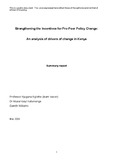| dc.description.abstract | This report is a summary of a study commissioned by DFID Kenya on the drivers of pro-poor
change. It considers the processes, institutional changes and actors that may drive or block propoor
change in Kenya. It argues that the critical obstacles to bringing about change lie in the
realm of political economy and governance. The fundamental problem in Kenya is that the
political elite have been able to capture public institutions and resources to serve their private
interests. In this context there is little sense of public accountability, corruption has flourished,
public institutions have declined, growth has faltered and poverty has worsened. The types of
policy reforms that are required to reverse this decline are fairly well understood. Yet, the political
elite, who benefit from the status quo, have generally opposed desirable patterns of change.
This report argues that pro-poor change will require a shift in the nature of incentives and
restraints facing the political elite, and supporting changes in donor behaviour. There are several
types of processes that are critical to bringing about such a transformation:
1) Creating demand for change. In the past, reforms have usually occurred when the elite has
come under sustained pressure from interest groups. A key challenge will be to strengthen the
voice and organisation of all citizens, the poor in particular, to exert pressure on the elite. A wide
range of processes are relevant in this respect, including globalisation, urbanisation and
education, the actions of pressure groups and coalitions between different types of change agent.
An important source of demand will be to encourage expectations surrounding access to services
(e.g. universal primary education)
2) Strengthening response to demand. Even where there is a strong demand for change, the
political system and government bureaucracy may not be able to respond. Key blockages in
Kenya include the nature of political parties, the centralisation of power and the weak performance
of the civil service.
3) Creating broader public accountability. At present accountability is based on patronage and
clientelism rather than a sense of responsibility to society at large. Important priorities will be to
restore democratic checks and balances, strengthen institutions of accountability, improve access
to information, broaden the tax base and tackle corruption.
4) Changing elite perceptions. The elite have generally opposed pro-poor change where this
threatens their interests and sources of patronage. However, elite perceptions of poverty can
change under certain conditions making pro-poor change more likely
5) Strengthening external sources of influence, such as regional organisations and donor
engagement.
The report identifies a large number of operational implications for donor programmes. Certain
actions are highlighted as immediate priorities where there is already an opportunity for donor
engagement and where domestic political support is relatively strong. These include: (i) support to
parliament, (ii) restoring other democratic checks and balances, (iii) universal primary education,
(iv) tax reform, (v) land reform, (vi) regional integration, and (vii) supporting private sector
organisations.
A number of other areas for donor support are identified as having potential to bring about
change, but preparatory work must first be undertaken and political ownership established. These
include devolution, civil service reform, security sector reform, broadening access to independent
media and support to universities and research institutes.
A general lesson emerging from the study is that donors have limited direct influence on
government. Conditionality should be avoided. However, there are opportunities to respond to
and work with domestic pressures for change in civil society and the private sector. | en |

